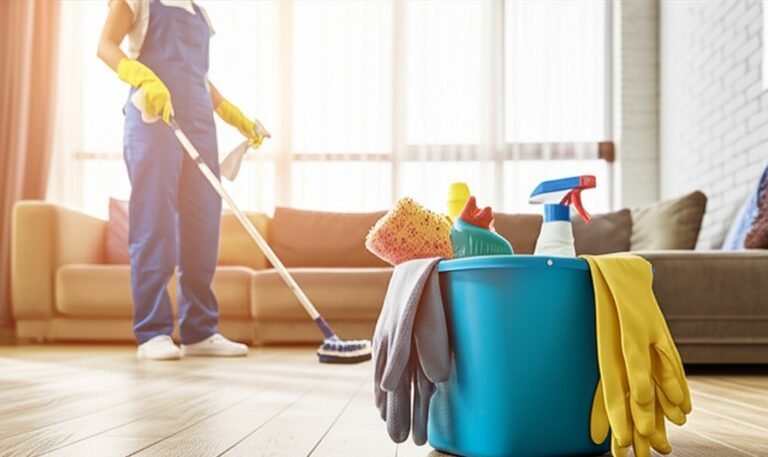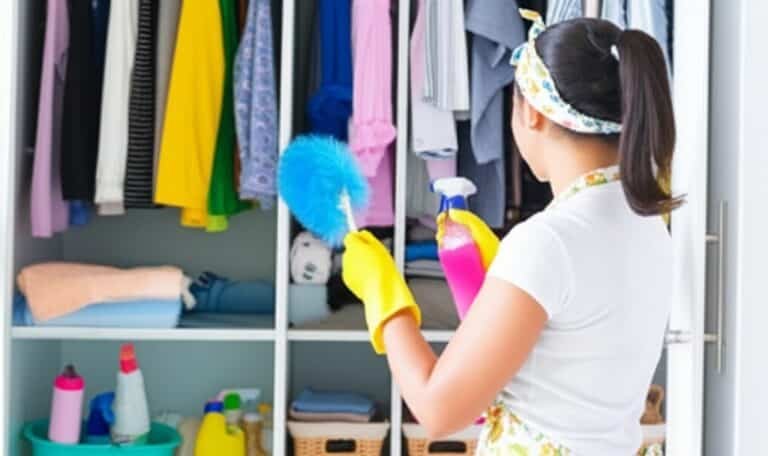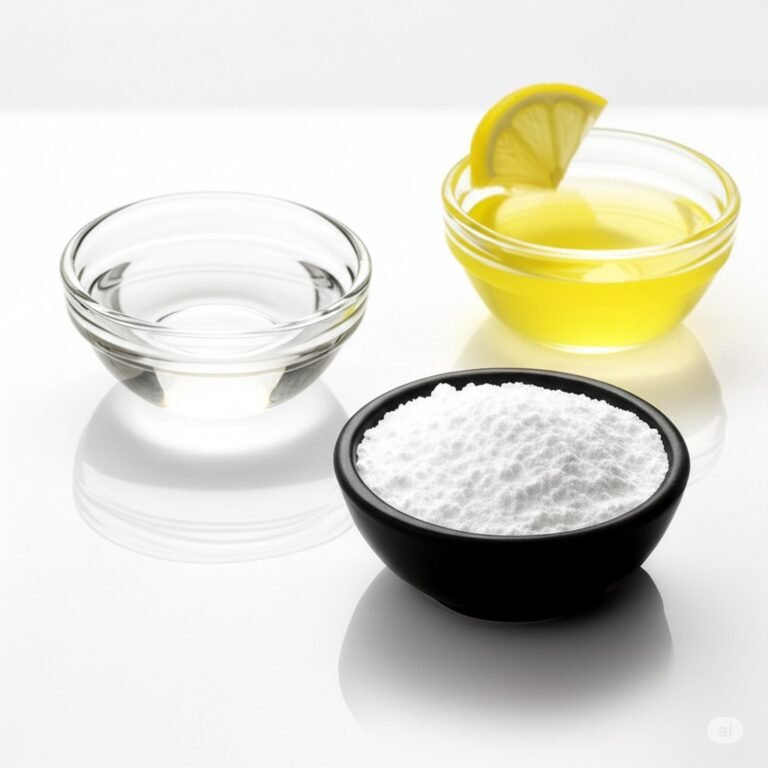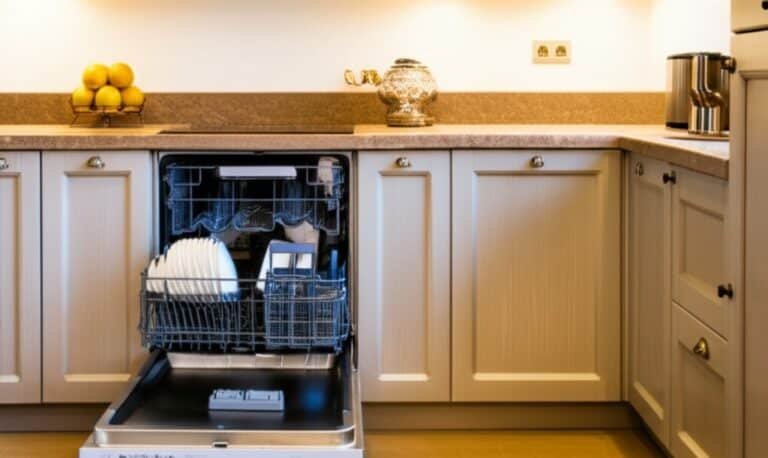Ah, the joys of parenting—where every day feels like a quest to keep the chaos at bay, especially when it comes to maintaining a home clean with kids. Adorable as they are, can turn a tidy space into a disaster zone in the blink of an eye. But fear not! Keeping your home clean, even with the whirlwind of activity that comes with kids, is totally doable. Here are five essential tips to help you maintain a semblance of order and cleanliness, without losing your mind.
1. The Power of Baskets and Bins
Start by selecting a variety of baskets and bins that complement the decor of your home. This way, they don’t just serve a functional purpose but also add to the aesthetics of your space. You can choose from wicker baskets, colorful bins, or even fabric boxes that can be folded away when not in use. The key is to have enough of them in each room so that every item has its potential home.
In the living room, for instance, have a large bin where all the toys can be quickly tossed in at the end of playtime. In the bedroom, smaller baskets can be used for storing socks, undies, and those endless art supplies that somehow find their way under the bed. The kitchen and dining area can benefit from a couple of bins too, for storing craft supplies or the myriad of plastic cups and plates that seem to multiply overnight.
But how do you get the kids on board with this system? Make it a fun, engaging activity for them. For younger kids, turn cleanup time into a game by setting a timer and challenging them to beat the clock. For older children, you could assign specific baskets or bins as their personal responsibility, giving them the pride of ownership and a direct role in keeping the home tidy.
Another trick is to label each basket or bin with pictures or words, depending on your child’s age. This not only helps them understand where things go but also aids in their reading or recognition skills. It’s a win-win!
Remember, the goal isn’t just to keep your home tidy but also to instill in your kids the value of organization and the satisfaction that comes from a well-kept space. By incorporating baskets and bins into your daily routine, you’re teaching them life skills that go beyond just cleaning up after themselves. You’re teaching them respect for their environment and the importance of contributing to the household’s overall well-being.

2. Embrace the Routines
When children know what’s expected of them and when, they’re more likely to engage in the task with enthusiasm. This is why turning tidy-up times into a playful challenge can be so effective. Imagine dancing around the living room with a timer set, racing to beat the clock together. It transforms cleaning from a chore into a fun activity that they look forward to.
Incorporating these routines into daily life teaches children about the importance of consistency and effort in maintaining a pleasant living environment. It’s a valuable lesson that extends beyond the walls of your home, preparing them for adulthood with a strong foundation in personal responsibility and self-care.
But routines have another, often overlooked benefit: they can significantly reduce stress for the entire family. When kids are involved in regular clean-up activities, the home stays neater, and there’s less for parents to do at the end of the day. This means more quality time spent together, enjoying each other’s company, rather than feeling overwhelmed by a disorganized home. Plus, starting and ending the day with a quick tidy-up helps create a calming transition into and out of the day’s activities, setting a positive tone and fostering a sense of accomplishment.
3. Everything Needs a Home
By involving children in the process of deciding where items should go, you’re giving them a voice in how their space is organized. This empowerment can lead to a greater willingness to keep their areas tidy because they’ve had a hand in setting up the system.
This approach can be tailored to the specific interests and developmental stages of each child. For younger children, picture labels on bins can make the sorting game more accessible and enjoyable, turning cleanup time into an educational activity that reinforces language and recognition skills. For older kids, allowing them to choose the containers or the organization layout for their belongings can foster creativity and independence, making them more likely to adhere to the system they’ve helped create.
Another aspect of giving everything a home is the ease with which it enables daily routines. When each toy, book, or craft supply has a specific place, it simplifies the process of tidying up. Children know exactly where to put things without constant reminders, reducing the likelihood of items being misplaced or left out. This not only keeps the home neater but also teaches children valuable organizational skills that will benefit them in many aspects of life, from schoolwork to personal relationships.
Additionally, this orderly approach can reduce the stress and frustration that comes from searching for lost items. A well-organized space means less time spent hunting for that one missing puzzle piece or the favorite crayon, leading to a smoother, more enjoyable daily life.
4. Involve the Kids in Cleaning Tasks
When children participate in household chores, they gain a sense of responsibility and learn the importance of contributing to the family team. This collaborative effort helps them understand the value of work and the satisfaction that comes from a job well done.
Engaging kids in cleaning tasks can be a fantastic opportunity for teaching time management and prioritization skills. By assigning tasks that need to be completed within a certain timeframe, children learn to manage their time effectively, a skill that will serve them well throughout life. As they juggle cleaning tasks with homework and playtime, they begin to understand how to prioritize their responsibilities, making them more independent and capable individuals.
In addition to the practical skills gained, involving kids in cleaning tasks fosters a sense of equality and cooperation within the family. When everyone, regardless of age, contributes to maintaining the home, it reinforces the idea that everyone’s efforts are valued and important. This can help reduce the sense of entitlement some children develop and instead fosters a strong work ethic and appreciation for the contributions of others.
To keep children engaged and motivated, it’s crucial to make the cleaning tasks as enjoyable as possible. This could involve turning cleaning into a game, creating a family cleaning playlist to dance to, or setting up a rewards system for completed chores. Rewards don’t always have to be material; they can include extra playtime, choosing the movie on movie night, or other privileges. What matters is that the reward is meaningful to the child and reinforces the positive behavior.
As children grow and their skills improve, gradually introducing more challenging tasks can help them build confidence and self-esteem. For example, older children can be taught to cook simple meals, manage their laundry from start to finish, or take on more significant roles in organizing and decluttering efforts. These tasks not only contribute to the cleanliness and functionality of the home but also prepare them for independent living in the future.

5. Set Up Cleaning Stations
These strategically placed cleaning stations can be tailored to the specific needs of each area. For instance, a kitchen cleaning station might include antibacterial sprays and heavy-duty wipes for dealing with food spills and surfaces, while a bathroom station could be stocked with products designed for tile, grout, and fixtures. This customization ensures that the right tools are always at hand for the job, making cleaning tasks more efficient and effective.
In addition to making cleaning easier, having visible cleaning stations can also serve as a subtle reminder to all family members of the ongoing commitment to maintaining a clean and organized home. It’s a visual cue that everyone, not just the adults, can participate in upkeep, reinforcing a culture of cleanliness and shared responsibility.
Implementing these cleaning stations can also be an educational opportunity for kids. It’s a chance to teach them about the safe and proper use of cleaning products, the importance of hygiene, and the specific cleaning needs of different areas of the home. This knowledge is part of empowering them to take an active role in the care of their living environment.
To further enhance the effectiveness of cleaning stations, consider including a simple checklist or instructions at each station. This can help ensure that tasks are completed thoroughly and correctly, even when you’re not there to oversee the work. For example, a checklist in the bathroom might remind children to wipe down the counter and faucet after brushing their teeth, promoting good habits and consistency in cleaning routines.
6. Keep the Mess Contained
Establishing specific zones for play, you create an environment where kids can express themselves and explore their creativity without imposing chaos on the entire household. This balance between freedom and structure is key to a harmonious home life, allowing for both relaxation and energetic play.
These designated play areas can be equipped with the appropriate storage solutions, such as bins and shelves, tailored to the types of activities that take place there. This not only aids in faster clean-up but also makes it easier for children to find and choose their activities. When toys and craft supplies have a specific “home” within these zones, children learn to be more organized and are more likely to return items after use.
Another aspect of this strategy is the flexibility it offers. While it’s important to have designated play areas, it’s also beneficial to allow for some flexibility on special occasions or for certain activities that require more space. For instance, building a fort or engaging in a family art project might temporarily extend beyond the usual play zones. The key is to return to the established boundaries after these special activities, reinforcing the norm while still allowing for exceptions that foster family bonding and creativity.
In addition to making clean-up easier, containing mess to specific areas can also reduce the risk of accidents, such as tripping over toys in walkways or spilling paint on the dining room table. It ensures that the home remains safe and navigable for all family members, including guests. This consideration is especially important in homes with young children or elderly family members, where safety is a paramount concern.

A Home Clean with Kids
Maintaining a clean home with children is indeed a journey of balance and understanding. It’s crucial to recognize that some days will be messier than others and that’s perfectly okay. The goal isn’t to maintain a showroom house but to create a living, breathing space where your family can grow, learn, and make memories together. Embracing the tips mentioned can significantly ease the burden of housekeeping, turning what might seem like an endless cycle of cleaning into manageable and even enjoyable tasks. Encouraging children to take part, establishing simple routines, and having specific areas for play and creativity can transform the way your family approaches cleanliness and organization.
However, even with the best routines and systems in place, there are times when a deeper clean is necessary, or perhaps you’re looking for a break to focus on family time without worrying about the state of your home. This is where professional cleaning services like Toronto Shine Cleaning come into play. They offer a range of services tailored to meet the unique needs of families, from regular housekeeping to deep cleaning sessions. Whether you’re preparing for a special event, dealing with the aftermath of one, or simply need a periodic deep clean to reset your home environment, Toronto Shine Cleaning can provide the expertise and attention to detail that frees up your time and energy for what truly matters.
Choosing to enlist the help of Toronto Shine Cleaning doesn’t just mean handing off chores; it’s about investing in your family’s well-being and happiness. A clean home can significantly impact your family’s health, reducing allergens and making for a more comfortable living environment.



















